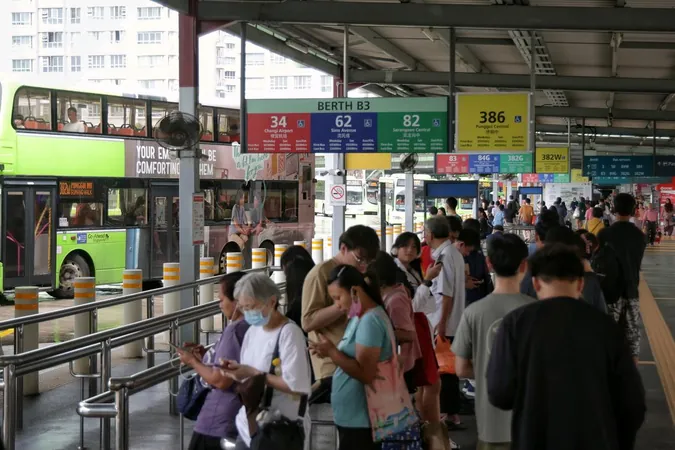
Japan's Foreign Minister Voices Serious Concerns Over China's Military Expansion Amid Tensions
2024-12-26
Author: Rajesh
Japan's Foreign Minister's Concerns
In a highly significant diplomatic exchange, Japanese Foreign Minister Takeshi Iwaya raised 'serious concerns' regarding China's military expansion during his first official visit to Beijing on December 25, 2024. This meeting, held at the luxurious Diaoyutai State Guesthouse, marked a crucial moment in Japan-China relations, which have been increasingly strained due to territorial disputes and military activities.
Monitoring China's Actions
During discussions with his Chinese counterpart, Wang Yi, Iwaya emphasized that Japan is 'closely monitoring the situation in Taiwan and recent military developments' indicative of China's assertiveness in the region. He elaborated on Japan's concerns regarding the East China Sea, specifically addressing the escalation of military activity near the contentious Senkaku Islands, which are also claimed by China.
Detained Japanese Nationals
Furthermore, Iwaya called for the prompt release of Japanese nationals detained by Chinese authorities, highlighting the uncertainties surrounding China's anti-espionage laws that have deterred Japanese citizens from visiting the mainland.
Efforts to Ease Tensions
In an effort to ease tensions, both ministers expressed a desire to facilitate a visit by Wang to Japan at the earliest opportunity in the upcoming year. However, the Chinese Foreign Ministry remained tight-lipped about military discussions during the meeting.
Meetings with Chinese Leadership
Earlier that day, Iwaya also met with Chinese Premier Li Qiang, striving to cultivate a 'constructive and stable' bilateral relationship. Despite being significant trading partners, both nations have faced escalating friction over disputed territories and military spending, which have marred their diplomatic ties.
Recent Escalations
Tensions reached a peak earlier this year when a Chinese military aircraft made the first sanctioned entry into Japanese airspace, prompting Japan to bolster its defense alliances, particularly with the United States. Concurrently, the region witnessed Japan's naval forces navigating through the Taiwan Strait for the first time, a move signaling its commitment to asserting maritime security.
Ballistic Missile Incident
The situation intensified further in late September after China launched an intercontinental ballistic missile into the Pacific, igniting protests from Japan, which criticized the absence of prior notification. Adding fuel to the fire, the two nations clashed over Japan's decision to discharge treated water from the Fukushima Daiichi nuclear plant into the ocean—a measure deemed safe by the International Atomic Energy Agency but labeled 'selfish' by China. The fallout resulted in a complete ban on Japanese seafood imports, though recent statements from China indicated a gradual resumption of trade.
Economic Interdependence
Despite these ongoing disputes, both nations recognize the deep economic ties that link them. In 2022, China imported seafood worth over $500 million from Japan, underscoring mutual dependence even amid tensions.
Historical Grievances
Additionally, unresolved historical grievances related to Japan's occupation of Chinese territories during World War II continue to sour relations. Beijing frequently criticizes Tokyo for not adequately addressing this dark chapter in history, especially in light of visits by Japanese officials to the Yasukuni Shrine, which honors war dead including convicted war criminals.
Looking Ahead
As diplomatic efforts unfold, the world watches Japan and China navigate this complex landscape of military, economic, and historical challenges, in hopes of achieving a more stable future. Will these discussions lead to lasting peace, or are we on the brink of escalating tensions? Only time will tell.




 Brasil (PT)
Brasil (PT)
 Canada (EN)
Canada (EN)
 Chile (ES)
Chile (ES)
 España (ES)
España (ES)
 France (FR)
France (FR)
 Hong Kong (EN)
Hong Kong (EN)
 Italia (IT)
Italia (IT)
 日本 (JA)
日本 (JA)
 Magyarország (HU)
Magyarország (HU)
 Norge (NO)
Norge (NO)
 Polska (PL)
Polska (PL)
 Schweiz (DE)
Schweiz (DE)
 Singapore (EN)
Singapore (EN)
 Sverige (SV)
Sverige (SV)
 Suomi (FI)
Suomi (FI)
 Türkiye (TR)
Türkiye (TR)